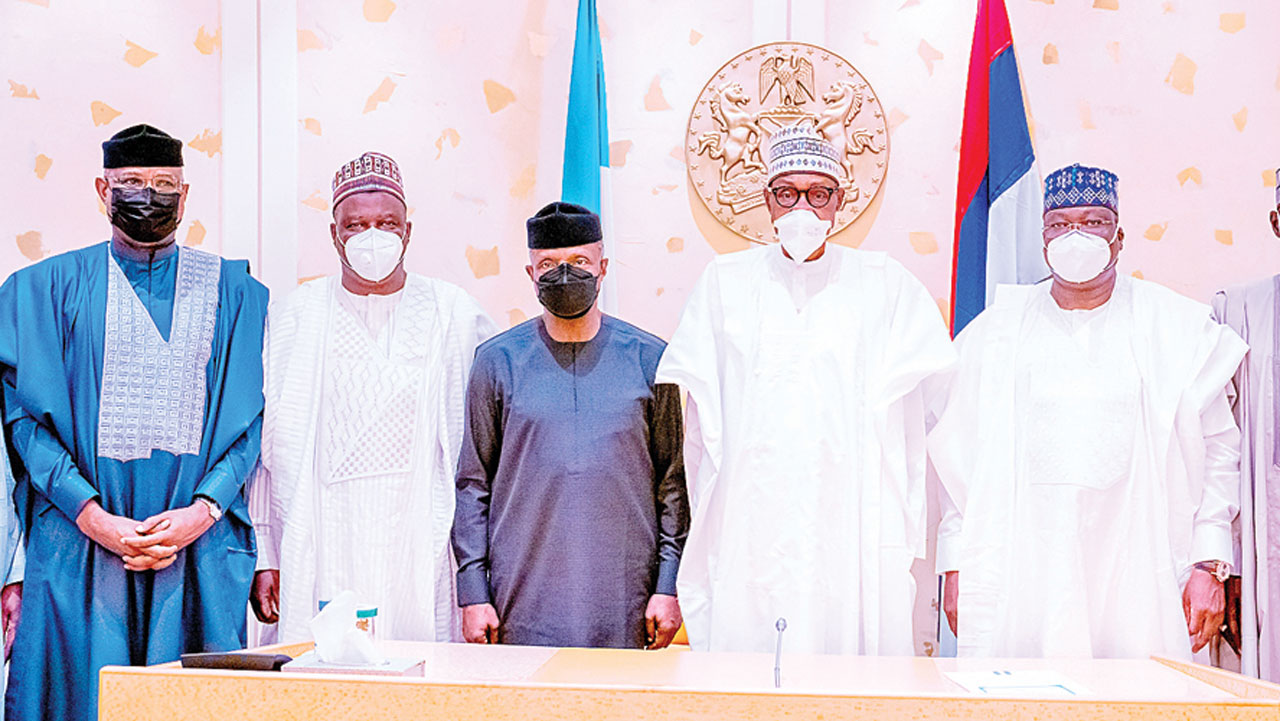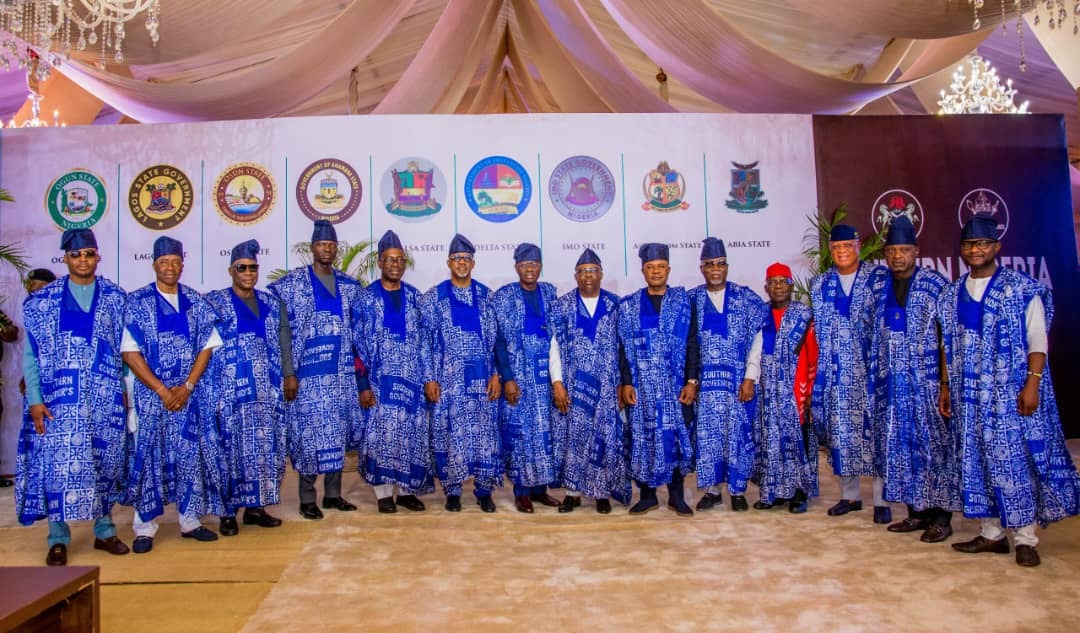
• Buhari tasks steering committee on 12-month deadline
• Says Nigeria lost $50b worth of investment in 10 years
• PGF says Act is APC’s commitment to economic restructuring
The Federal Government has embargoed implementation of the Petroleum Industry Act (PIA) till August 2022. President Muhammadu Buhari gave this hint when he inaugurated a steering committee to oversee the process yesterday.
Unveiling members of the steering committee, President Buhari said it has 12 months duration for the assignment, while he expects periodic updates to be given to him.
While directing immediate implementation of the framework for the PIA, he urged relevant stakeholders to comply and reposition for full activation within 12 months.
The steering committee is headed by the Minister of State, Petroleum Resources, Timipre Sylva. Other members include Permanent Secretary, Ministry of Petroleum Resources; Group Managing Director, Nigerian National Petroleum Corporation (NNPC); Executive Chairman, Federal Inland Revenue Service (FIRS); representative of the Ministry of Justice; representative of the Ministry of Finance, Budget and National Planning; and Senior Special Assistant to the President on Natural Resources, Olufemi Lijadu as External Legal Adviser.
The Executive Secretary, Petroleum Technology Development Fund, will serve as Head of the Coordinating Secretariat and the Implementation Working Group.
The primary responsibility of the steering committee will be to guide the effective and timely implementation of the PIA in the course of transition to the petroleum industry envisaged in the reform programme, and ensure that the new institutions created have the full capability to deliver on their mandate under the new legislation.
The PIA provides legal, governance, regulatory and fiscal framework for the petroleum industry, development of host communities and related matters.
The President noted that Nigeria lost an estimated $50 billion worth of investments in 10 years, created by the uncertainty of non-passage of the Petroleum Industry Bill (PIB), lack of progress and stagnation in the sector.
In his remarks at a ceremony on passage of the PIA, which preceded the Federal Executive Council (FEC) meeting, the President said the stagnation affected growth of the economy, citing lack of political will on the part of past administrations to actualise the needed transformation.
He said: “This administration believes that the timely passage of the PIB will help our country attract investments across the oil and gas value chain.”
President Buhari noted that signing of the bill was part of the administration’s commitment to building a competitive and resilient petroleum industry that will attract investment, improve the nation’s revenue base, create jobs and support Nigeria’s economic diversification agenda.
The President said: “As a nation that depends on oil resources for the development of other sectors, Nigeria runs a petroleum industry that is governed largely by laws enacted over 50 years ago such as the principal legislation; the Petroleum Act of 1969 and other obsolete legislations.
“The Petroleum Industry Act 2021 will create a regulatory environment that would ensure efficiency and accountability across the oil and gas value chain and reposition NNPC to a commercially driven National Petroleum Company that is accountable to the federation.
“The Act also provides for a direct benefit framework that will enable sustainable development of host communities. I appeal to the host communities to look carefully at the contents of the Act, which in the implementation will bring real and lasting benefits to them.
“Furthermore, the Act provides for deliberate end to gas flaring, which would facilitate the attainment of Nigeria’s nationally determined contributions of the Paris Agreement through a funding mechanism to support gas flare out project in host communities,’’ he added.
The President commended the leadership of the ninth Assembly for their continued pursuit of national aspiration and demonstration of mutual harmony with the executive in the pursuit of patriotic outcome in passage of PIB.
The ceremony was attended by the Senate President, Dr. Ahmed Lawan; Deputy Senate President, Ovie Omo-Agege; Deputy Speaker, Ahmed Idris Wase; and other lawmakers, members of the Federal Executive Council (FEC) and Group Managing Director of the NNPC, Mele Kyari.
THE 23 All Progressives Congress (APC) governors under the umbrella of Progressive Governors Forum (PGF) have described the PIA as the party’s convincing credential to restructure the Nigerian economy through the democratic process. They expressed their excitement over the prospect of additional oil revenue earnings following enactment of the PIB into law.
The PGF commended President Muhammadu Buhari for the historic feat of moving the nation forward and the National Assembly for their parliamentary input in articulating the Bill after several years of abandonment.
In a statement signed by the Forum’s Chairman, Governor Abubakar Atiku Bagudu of Kebbi State, it said even critics of the ruling party and the governments cannot ignore the fact that the coming into law of the PIA is an important democratic milestone.
According to the statement, ‘the new PIA presents a convincing credential of the commitment of our party, APC, to restructure the Nigerian economy through the democratic process in line with provisions of the 1999 Constitution as amended.
“Inspired by our leader, President Buhari, we are confident that democratic engagements based on strategic considerations of legislative proposals in the National Assembly to make or review existing laws, the Nigerian economy will be fully restructured.
“With the new Act, there should be remarkable improvement in revenue collection from the oil and gas sector. This is expectedly the Next Level governance initiative our party promised Nigerians during the 2019 campaigns.”
However, the position taken by the forum of APC Governors appears to reject the resolution of the Southern Governors, which had at its last meeting held in July rejected the provision of three per cent for host communities.
The Southern Governors, which has Ondo State Governor, Rotimi Akeredolu, also of the APC as chairman, also rejected the ownership structure of the proposed NNPC. The forum disagreed that the company be vested in the Federal Ministry of Finance and suggested that it “should be held in trust by Nigeria Sovereign Investment Authority (NSIA), since all tiers of government have stakes in that vehicle.”
But Governor Bagudu recalled that aside from the three per cent for the proposed Host Communities Development Trust, the South-south states already enjoy 13 per cent derivation apart from funds allocated to the Federal Government intervention agency, the Niger Delta Development Commission (NDDC).
The Kebbi governor equally defended the creation of Frontier Exploration Fund with 30 per cent of NNPC Limited profit for hydrocarbon exploration in the Frontier Basins.
The PGF Chairman further argued that the contentious provision was meant to “guarantee exploration activities in the country beyond discretionary decisions of the management of the new NNPC Limited.”






